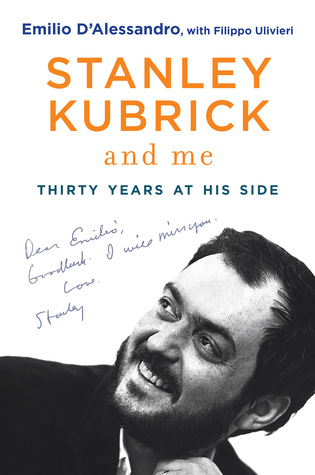 By EMILIO D’ALESSANDRO, FILIPPO ULIVIERI (Arcade Publishing; 2012/16)
By EMILIO D’ALESSANDRO, FILIPPO ULIVIERI (Arcade Publishing; 2012/16)
For Stanley Kubrick buffs this memoir, written by Kubrick’s longtime personal assistant, can be classified as one of the few truly essential print resources on the great man. It’s certainly the only one I’ve come across that presents the famously eccentric Kubrick in a wholly sympathetic light; sure, he comes off plenty weird, as was his nature, but STANLEY KUBRICK AND ME is quite affectionate nonetheless, especially when compared with John Baxter’s famously acerbic 1997 Kubrick biography and Vincent LoBrutto’s more hero-worshippy but still sharp-edged bio from the same year.
As described here, the Italian-bred, London-based Emilio D’Alessandro was a sparsely educated automobile enthusiast when in the spring of 1971 he was sent by the delivery company he worked for to the home of Stanley Kubrick. D’Alessandro was quickly inducted into Kubrick’s life and business affairs, serving as a driver, handyman and butler. It helped, of course, that D’Allessandro had an inexhaustible work ethic, and so was able to keep up with Kubrick’s labor intensive perfectionism—which of course didn’t help D’Allessandro’s relationship with his wife, who nonetheless held on throughout the sometimes-turbulent 28 years D’Allessandro spent with Kubrick.
The relationship between the intellectual Kubrick and the car-obsessed D’Allessandro, who didn’t get around to actually seeing any of his boss’s films until many years into his employment, was an odd but enduring one, with D’Allessandro present for the making of A CLOCKWORK ORANGE, BARRY LYNDON, THE SHINING, FULL METAL JACKET and EYES WIDE SHUT. D’Allessandro admits to quitting his post in 1994, but he returned to Kubrick’s side two years later to resume where he left off—unfortunately that continuation didn’t last very long, as Kubrick died during the early 1999 postproduction of EYES WIDE SHUT, and D’Allessandro decamped to Italy shortly thereafter.
Juicy tidbits? Sorry, but outside the revelation that Jack Nicholson was as nutty off-screen during the filming of THE SHINING as he was onscreen, there aren’t too many. In fact, the book’s major revelation is how sane and kind-hearted Kubrick comes off throughout, a fact that apparently surprised even Kubrick’s cast members, who D’Allessandro constantly had to reassure before they met their director—with their apprehension inevitably turning to bemused surprise upon finding out that he wasn’t such a terrible guy after all.
This book, much like Emilio D’Allessandro himself, is compelling in its own low-key, unassuming manner, and quite moving in the final passages, which detail Kubrick’s untimely demise. The book’s appeal is, aside from its unprecedented portrayal of Stanley Kubrick, in its depiction of a quiet individual whose life was rendered interesting almost in spite of itself.
